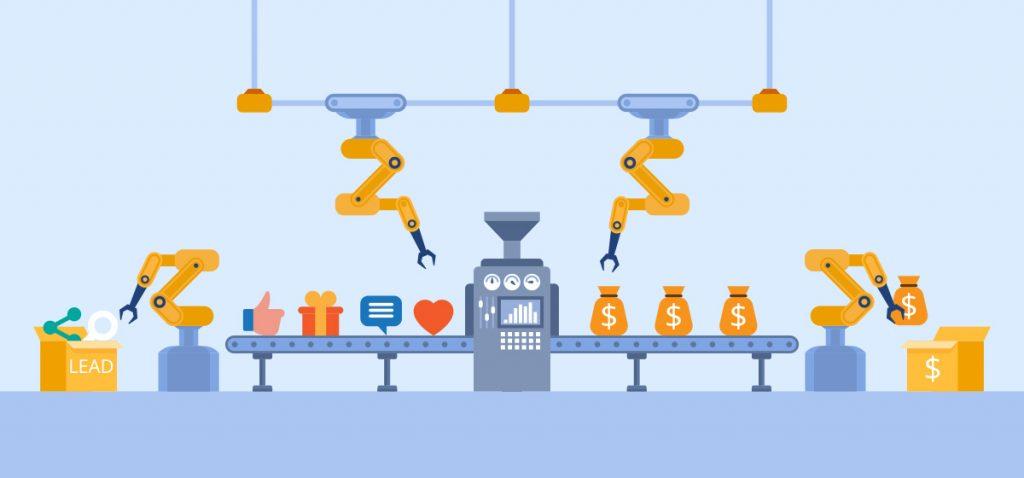
The Complete Guide to Industrial Marketing
Industrial B2B buyer behaviors have dramatically shifted in the last decade and with that, successful industrial marketing strategies have shifted as well.
Traditional marketing is lacking ROI and industrials who are looking to grow have to adopt modern marketing methods that are tailored to the B2B industrial sector.
In order to align marketing with the proper audience at the proper time, it’s important to understand what is meant by industrial marketing, how it differs from consumer marketing, the challenges facing industrial marketing and industrial marketing tool set.
What is Industrial Marketing?
Successful industrial marketing means putting your product, service, or message in front of a targeted industrial audience in order to raise awareness, drive engagement, and move your audience toward a purchasing decision.
Industrial marketing is usually a B2B strategy but can be B2C for industrials who sell direct to consumer or want to build demand in an end user in order to increase sales from B2B distributors.
Industrial Marketing vs. Traditional B2B & B2C Marketing
Industrial marketing has several distinct differences from B2C (business to consumer) marketing as well as traditional B2B marketing.
The strategies, the time frame, and the audience of industrial marketing differ from B2C marketing.
Here are the main differences:
1. Long and technical industrial research phase
Industrial businesses looking for a new product or service vendor are spending a lengthy period of time researching solutions and organizations.
This may take several months and their research may include comparing spec sheets, consuming product videos, reading customer testimonials, researching best practices, reading white papers and more.
2. Higher dollar products and services
Industrial purchases may require significant financial investments. Industrial equipment needs to withstand millions of product runs and industrial material supply needs to work for a wide variety of applications and end-user needs.
3. Customer acquisition usually equals long term partnership
Industrial buyers aren’t just looking for a one-time purchase. They’re looking to build an ongoing professional relationship with a supplier or distributor they trust.
Acquiring a new customer usually means a long term partnership if your product meets their needs and your service department maintains a high-quality relationship.
4. The person doing the research isn’t the person making the final decision
Large capital investments require a high level of approval by a c-leader or team of leaders. The person doing the research may be in charge of making the recommendation and of final product implementation but further approvals will be required.
Challenges Facing Industrial Marketing
1. Transition from traditional to inbound marketing
The industrial buyer follows a different purchasing path than a consumer. As such, industrial marketers are making the shift from top-of-funnel related traditional marketing strategies to a comprehensive inbound marketing strategy.
Inbound marketing attracts organic traffic at the exact time that industrial research is being done. It then provides lead-generating opportunities and nurtures leads into sales with marketing and sales integration.
2. Adopting new marketing channels and strategies
Industrial marketing has deep human-to-human roots. Business was done with a handshake. New customers came via word-of-mouth referrals, and trade shows were a reliable source for high quality and high quantity leads.
With modern industrial marketing, new digital channels and strategies need to be adopted. Successful marketers are staying on top of current trends and adopting practices that have the highest ROI.
3. Converting industrial leads into sales
Lead generation is hard-fought, and converting leads into sales is even harder fought. Prospects are following several potential vendors online and opting into their email lists. Earning an inbound lead, no longer means that it’s an easy jump to converting them into a sales qualified lead.
The buying process is long, decisions are complex, and turning leads into sales is one of the biggest challenges facing industrial marketing.
Industrial Marketing Strategies to Increase Traffic
A successful online marketing strategy begins with robust and sustainable website traffic.
There are various ways for industrials to generate increased website traffic and each company must consider their goals, timeline, and budget in order to determine the best method or combination of methods to invest in.
1. SEO (search engine optimization)
Industrial SEO can attract massive amounts of long term sustainable traffic due to the enormous amount of online research customers make before a decision is made. By strategically targeting high value keywords and key phrases with industrial content marketing, industrial marketers can earn quality traffic and an opportunity to generate marketing qualified leads.
2. PPC (pay-per-click)
PPC is the most instant and reliable method for generating targeted traffic exactly when it’s needed within a customizable budget. The downside to PPC is that your website traffic instantly ends when you stop paying for clicks, it costs more than SEO, and tends to have a lower click-through-rate.
3. Social Media
Social media is free, people of any professional background can post social media updates, and it can drive traffic to industrial websites. The most important things about social media are to focus only on the platforms where your audience is spending time such as LinkedIn, Youtube, or Facebook. Then the most successful posts are posts that are of interest to your audience, not to your company. Find out what types of content your audience wants to consume and post accordingly.
4. Email Marketing
Email marketing can help drive repeat visitors to your website. Most email subscribers got on your email list by filling out a form, or requesting specific information. Nurturing them can get visitors to return to your website to engage with more content and continue their customer journey.
Industrial Marketing Strategies to Build Demand
If your industrial business is only competing on price, you’re in a losing game. There is always a cheaper alternative, but a manufacturer who builds demand for their brand and values will always have an audience considering their products and services.
1. Video marketing
Video content can be a secret weapon in your industrial marketing arsenal for a few reasons. One, not everybody is producing video yet. Especially in the industrial sector, few manufacturers are producing regular industrial video content. Two, the most valuable connections happen face-to-face and video makes your audience see, hear, and feel your team’s values through engaging video content. And three, adding video to a post increases traffic by 157%.
2. Content marketing
You may have heard that content is “king”, but why? Quality content solves problems that users are researching on Google. It gives specs, it compares similar products, it outlines best practices, and it meets the needs of a defined audience.
When your business is recognized as a source of consistently high quality content, you not only drive traffic from search engines but you incentivize return website visitors who view you as the authority in your industry.
3. Brand development and differentiation
As more global markets are becoming increasingly saturated with competition, industrial brand development is critical for businesses who want to be viewed as a market leader. Lack of brand differentiation results in price.
Successful industrial brands exemplify the values and goals of a defined audience by developing a consistent and strategic logo, website, content strategy, core messaging, product positioning, and more.
Industrial Marketing Strategies to Generate Online Leads
The next step to growing industrial marketing is to convert website traffic into marketing qualified leads. After they become familiar with your company and your expertise by spending time on your website, Here are various methods for generating industrial leads on your website
1. Lead generating content
Offering a more formal piece of content in exchange for an email address is the easiest way to generate online leads. Content such as free guides, whitepapers, and checklists can be a great place to start. If users are already interacting with content on your website, it’s a natural next step to submit their email address to download a free guide you wrote on the same topic.
2. Webinars
Webinars serve multiple marketing purposes. They generate leads for you and they also cause your audience to spend a significant amount of time with you and your brand. You get a set amount of time to showcase your expertise and humanize your brand and then you also have a captive audience who will hear you out when you pitch your products and services at the end of your webinar.
3. Free trials and samples
In some industries, offering samples and trials is a practical way to put your product in the hands of potential customers and collective. You generate a lead with contact information and are able to have your sales team follow up after or during the trial period.
Social Media for Industrials
Social media is a useful industrial marketing tool because it’s free and anyone can post and share regular content updates. In order to make social media effective for industrials, it is more important to understand where your audience is spending time online. Social media can be time-consuming and it’s easy to waste time posting to social channels that have very low engagement from your audience. For many industrials, LinkedIn is a better platform for social media than Facebook. LinkedIn is made up of business leaders and decision-makers and tends to have more engagement in the manufacturing industry.
Youtube may also be a strategic place to post videos answering technical questions or demonstrating how to use a technical process in your industry. Not only does it position your brand as having expertise but 65% of senior executives navigate to a site after viewing a related YouTube video.
Industrial Web Design
Your industrial website has the extremely important job of converting visitors into leads. Sound logical? Well only about 22% of businesses are satisfied with their conversion rates which means that even if industrial websites are generating traffic, most businesses aren’t pleased how much of their traffic is converting into leads and sales.
Here are 3 things to consider with industrial web design:
Lead ready websites
Industrial websites should be designed to be lead ready. Lead ready means a design that funnels users into strategic pages that move users along the customer journey step by step. Lead ready websites have offers placed throughout the website that match user interest at different points of the marketing funnel. Offers are designed to capture the appropriate contact information and trigger a matching email automation campaign.
Content-rich
Effective industrial websites are content rich. That content may be rich imagery, videos to engage with, podcasts, product visualizers, and more. Rich content increases engagement and connects website visitors with your company getting them to spend more time on your website while building trust in your brand.
Video forward
Industrial video marketing is no longer optional. Product videos can increase purchases by 144% which also means that NOT having product videos limits your sales potential and some of your website visitors may purchase from the competitor that DOES have product videos. As mentioned above, video content also personalizes your company in an otherwise cold feeling industry.
Growing Your Industrial Business With Modern Marketing
The manufacturing industry is transitioning from traditional marketing to modern marketing practices. While many businesses hold on to traditional marketing practices, the shifting digital era is changing industrial buying behaviors and changing buyer expectations. Businesses who don’t adopt modern marketing practices that address the full marketing funnel risk losing brand relevance and long term sales partnership.
The benefits of modern marketing include more sustainable traffic and lead systems and a more predictable sales flow. Modern marketing takes more time to get up to speed than traditional display advertising but yields longer term results with increased efficiency.





Comments are closed.